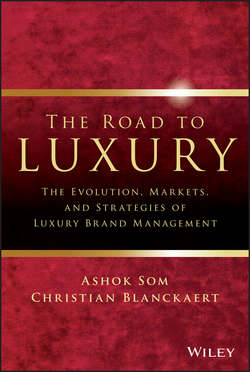Читать книгу The Road To Luxury - Blanckaert Christian - Страница 15
На сайте Литреса книга снята с продажи.
Chapter 2
Evolution of the Global Luxury Market
ОглавлениеLuxury is the opposite of vulgarity. Luxury is the opposite of status. It is the ability to make a living by being oneself. It is the freedom to refuse to live by habit. Luxury is liberty. Luxury is elegance. True elegance is refusal.
– Coco Chanel
The term luxury goods was popularized by Wall Street analysts who needed a term to describe companies such as LVMH, Richemont, and Gucci, which had become public companies. Prior to the popularizing of the term luxury goods, these companies were not really known as luxury goods companies but instead were known for their specific areas of expertise and the global reputation they had garnered.
Luxury is about exception and exclusivity, whether it comes to products, or services. A luxury product/service is unique, and not only because of its outstanding quality. It tells more than what it is. Beyond the usefulness or the wellness it brings, it tells a story, it reflects a style and a spirit that contribute to the dream. Luxury is about a product but also a brand, a universe.
– Eric Vallat, ex-Bonpoint
It is an association with a compelling and binding meaning in terms of emotional connectivity, personal harmony, spiritual connection or a connection to the world of the inherently beautiful, the greater the marginal value of the object to the seller.
– James Taylor, Harrison Group LLC
Luxury used to be “ordinary goods for exceptional people” but now can be defined as “exceptional goods for ordinary people.” It had to do with an object, its use, five senses, it was an offering, attraction, a product, a niche and serendipity. Today it is about marketing push, process, synergy, volume and efficiency.
– Wilfried Guerrand, Hermès
Luxury is a state-of-mind. It is about a bridge between dream and daily routine, a way of appreciating one's time and life, a statement of being oneself.
– Franka Holtmann, Le Meurice, Paris, and Feng Gao, ex-Bottega Veneta, China
The language of value in the world of objet de luxe is modest in inverse proportion to the price, value, and authenticity of the item. Value might connote a different meaning in the world of luxury.
The value of luxury products is shaped by meaning content, not design; even clumsy design can be valued, collected, and treasured.
– James Taylor, Harrison Group, LLC
The Boston Consulting Group defined luxury goods as “Items, products, and services that deliver higher levels of quality, taste, and aspiration than conventional ones.”
Luxury is also about brands. Bernard Arnault's famous definition notes that “Star brands should be timeless, modern, fast-growing, and highly profitable… There are fewer than 10 star brands in the luxury world, because it is very hard to balance all four characteristics at once – after all, fast growth is often at odds with high profitability – but that is what makes them stars. If you have a star brand, then basically you can be sure you have mastered a paradox.”
Buyers in this segment are not only interested in the product but also with its associated values in terms of class-consciousness, emotional and artistic appeal, a unique design, and a cultured and refined taste. Yves Carcelle, former chief executive of Louis Vuitton, said “It's about reliability, quality, style, innovation, and authenticity.”
Luxury products offer self-reflexive connections to a person's sense of self-esteem, competence, and personal value. It is said to be characterized by: “Inherent scarcity, sincerity, consistency, transitivity, emotional connectivity, mastery of excellence, service – elegance.”
Definition of Luxury is dialectic. Luxury is a break, a deviation from what is ordinary and what is necessary. And it is the variations between the ordinary and the necessary during different times, societies, and cultures that will lend themselves to major developments in luxury. Sacred in origin, secular when it becomes an instrument of worldly power (Louis XIV), reduced to a minimum for the emerging bourgeoisie (a comfort-based and necessity-based luxury), subject to market laws since the French revolution, a superfluous necessity of today. The dialectic is based on a double movement – on one hand, a human need to create a special moment, objects, practices, and behaviours discordant with the ordinary and necessary and on the other, a movement of integration for these gaps in the regular course of society. It is vital for human beings as they search for more, for better, for beautiful… It is nothing other than humanity forever separated from a world governed by the order of our needs, into an ideal world, where one shall desire what is good for him or her. Nothing more, nothing less. Hence the moral dimension is always attached to luxury.
– Emmanuelle Sidem, Connex Consulting
